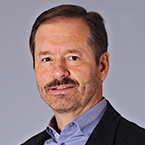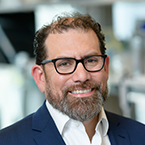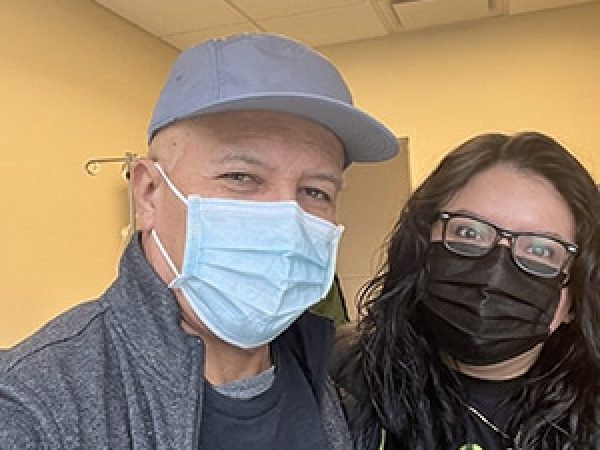A Discussion with Cancer Discovery’s Editors-in-Chief
This year marks the 10th anniversary of Cancer Discovery, a journal of the AACR. To celebrate the anniversary, Cancer Discovery published a special anniversary issue, featured spotlights on groundbreaking articles on its website, and held the Cancer Discovery 10th Anniversary Symposium in June. A recent blog post discussed these commemorations and captured remarks delivered at the symposium by the AACR and Cancer Discovery leadership.
Cancer Research Catalyst and AACR Stories spoke with Cancer Discovery’s Editors-in-Chief, Lewis Cantley, PhD, FAACR, and Luis Diaz, MD, about the journal’s origins, accomplishments, and future.
This interview has been condensed and edited for clarity.
How was Cancer Discovery conceived, and how has the journal evolved over its first 10 years?

Cantley: This year is the 10th anniversary of Cancer Discovery, and it has truly been a remarkable journey. The concept of starting a journal like Cancer Discovery came when Tyler Jacks was the President of the AACR. Jacks, AACR CEO Margaret Foti, and members of the AACR publishing group conceived the idea of a journal that would be very selective in the types of papers that it published in order to compete with other top journals, like Nature and Science, with regard to publishing top-rate papers focused on cancer.
It was quite remarkable how well the community embraced Cancer Discovery right from the beginning. Within the first year, we were already getting very significant papers submitted, and the first chance we had to have an impact factor, it was already at 10, which is quite remarkable for such an early stage.
Ten years ago was a very appropriate time to start a journal aimed at publishing top-rate breakthrough discoveries in basic cancer science and key clinical trials. By that time, it had become clear that targeted therapy could be effective if you selected patients based on mutational events. There had been a lot of skepticism in the community about this approach, but today, almost everyone, even in phase I studies, is selecting patients based on some phenotype (usually a mutational event), and so these biomarker-driven trials are really taking off.

Diaz: I remember when Cancer Discovery first came on the block. It was a different type of journal, and it was very clear that the mission was to fill the gap between discovery-based science and clinical research.
The initial impact factor of 10 was quite remarkable, as there are journals that have been around for four decades that have not reached that mark. I think that speaks to the wisdom of creating a journal around this space, and it highlights that there was truly a gap that wasn’t being met by the existing publications out there.
The other thing that I think was interesting was that as papers began to garner more attention and get published in Cancer Discovery, you started seeing other journals recalibrate and begin to look for these types of papers to complement their discovery science. I think Cancer Discovery not only filled a gap, it may have even changed how translational medicine, at least in cancer, is published. Attention to groundbreaking translational medicine is taken much more seriously now than it was before.
What we’ve seen over the past decade is a collapse of the time it takes to do clinical research and the time it takes to go from a hypothesis to a drug and into a clinical trial. We can now do science much faster, we can do clinical and translational research much faster.
I think you’re exactly right that the mutation-driven therapeutics approach has really taken off. If you look back at the major publications in Cancer Discovery, there are papers that have not only described new drugs against new targets and some of the phase I or II clinical trials, but also papers that have defined resistance mutations for many of these drugs, both on the targeted therapy side and on the immunotherapy side. These have been some of the most attention-grabbing articles and the most cited articles, certainly.
Can you share some examples of paradigm-shifting studies that have been published in Cancer Discovery?
Cantley: One such publication is from 2017 on AACR Project GENIE. This paper is a terrific summary of mutational events in cancer. It has a broad spectrum of data that is already getting many citations.
Another publication that I was particularly excited about was a study by Heymach and colleagues linking STK11 mutation and PD-1 inhibitor resistance in KRAS-mutated lung cancer. This paper showed that a combination of mutations can lead to resistance to immunotherapy, which was an unexpected but very important result in a very common cancer type.
In addition, a 2017 study by Victor Velculescu and colleagues was quite striking. This study examined the evolution of the neoantigen landscape in response to immune checkpoint blockade in non-small cell lung cancer.
Diaz: The 2012 paper introducing the cBioPortal for Cancer Genomics was quite a significant publication because it highlighted the complexity of cancer and provided an important resource for researchers. The cBioPortal compiles cancer mutation data from various panels and allows one to mine mutational data for a top-level view of the mutational landscape.
The other paper I want to highlight is a study by Andrew Allen and colleagues that identified an inhibitor that could overcome the EGFR T790M-mediated resistance to EGFR inhibitors in lung cancer. This paper showed that not only is the mutational landscape important in selecting the upfront therapeutic, but also that following resistance patterns can be quite informative in deciding next steps in treatment.
What were some highlights from the recent Cancer Discovery 10th Anniversary Symposium?
Cantley: I think the symposium was fantastic, and we had some really incredible speakers. I was quite impressed by the talks in the session that I chaired.
On the first day of the symposium, Ira Mellman gave a fantastic talk on immunotherapy and what’s happening in industry, which led to a lot of exciting discussions. Ashani Weeraratna gave a very interesting presentation on aging and cancer that was quite exciting and generated a lot of questions from the viewers. Then there was a presentation on microbiota-centered interventions for immune-oncology, which was delivered by Laurence Zitvogel. This is becoming a very hot field as well, understanding how the microbiota changes during cancer affect the immune system. Finally, Ross Levine gave a fantastic talk on clonal hematopoiesis.
Diaz: The second day of the symposium really encompassed not only the past but also the future. I spoke about the next phase of oncology drug development and moving toward therapeutics for earlier-stage disease.
Regina Barzilay spoke about artificial intelligence (AI)-based risk assessment models. A lot of the discoveries from the sequencing data that we’re amassing will feed into AI models quite nicely and will help us develop risk assessment models, not only for advanced disease but for early-stage disease as well. I really liked the approach that Katherine Janeway talked about, which was bringing precision medicine to children by taking the advances that we have made in adult patients and applying them to pediatric cases. Tony Mok and Alice Shaw expertly handled how precision medicine has changed cancer care and how to manage resistance going forward for some of these biomarker or therapeutic-addicted tumors.
I thought it was a comprehensive day, and I think we’ll see more of these types of symposia in the future.
What is your vision for Cancer Discovery for the next 10 years and beyond?
Cantley: Thinking forward about what Cancer Discovery is going to be publishing over the next 10 years, I think the area of nutritional intervention—both as prevention and as therapy—will be a focus. As a field, we have not seriously considered tailoring treatments to patients’ diets, but I think papers addressing these kinds of ideas are emerging. That is one area that I would like to see us publish more on.
Immune therapies are going to continue to be a hot field over the next five to 10 years. Engaging the immune system will be critical, and there will likely be a lot more tools than just checkpoint inhibitors as mechanisms to do that.
Diaz: Our readers are the researchers that will be developing the next line of therapies and approaches in medicine, so continuing to publish novel insights that move the field forward will be key. I also anticipate the journal publishing larger seminal clinical trials like those typically seen in the New England Journal of Medicine or Lancet Oncology.
I agree that preventive strategies, early detection strategies, and immunotherapy are going to be areas of focus over the next decade. Checkpoint inhibitors are important, but they only scratch the surface of the relationship between the cancer cell and the immune system. Additionally, I think we are just starting to learn how metabolomics and dietary and exercise changes may impact the evolution of cancer even before the first mutation appears. Shining light on those processes will be vital.
Cancer Discovery will continue to evolve with the field, and our editorial staff will continue to expertly find the best papers out there. I look forward to the next 10 years.



